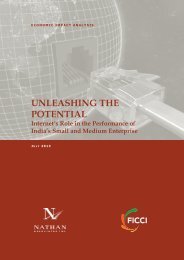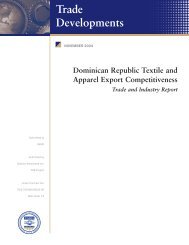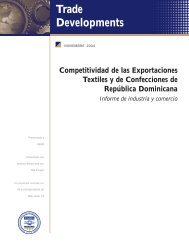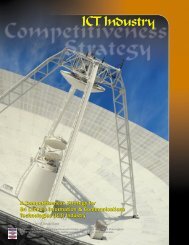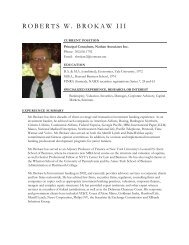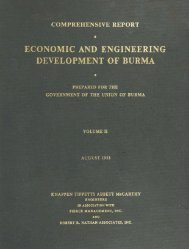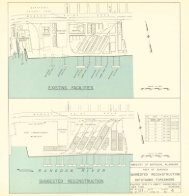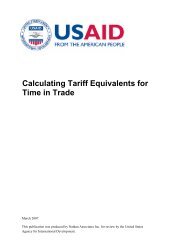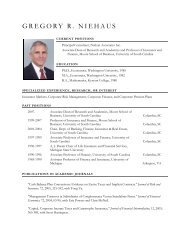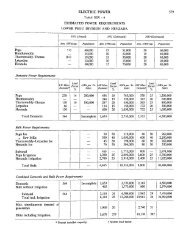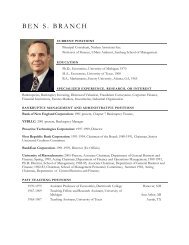Putting it to Work in Developing Countries - Nathan Associates
Putting it to Work in Developing Countries - Nathan Associates
Putting it to Work in Developing Countries - Nathan Associates
You also want an ePaper? Increase the reach of your titles
YUMPU automatically turns print PDFs into web optimized ePapers that Google loves.
labor market structure and flexibil<strong>it</strong>y all <strong>in</strong>fluence<br />
the effectiveness of technology transfer. A<br />
strong market-oriented policy framework is also<br />
cr<strong>it</strong>ical. 24<br />
HUMAN CAPITAL FORMATION<br />
Closely tied <strong>to</strong> technology transfer is the impact<br />
of FDI on human cap<strong>it</strong>al. FDI-based foreign<br />
affiliates usually provide more tra<strong>in</strong><strong>in</strong>g and skill<br />
development than domestic enterprises. Staff<br />
turnover among foreign affiliates tends <strong>to</strong> be<br />
lower than among domestic firms <strong>in</strong> the same<br />
host economy, so the affiliates likely <strong>in</strong>ternalize<br />
most skills upgrad<strong>in</strong>g. Tra<strong>in</strong>ed managers and<br />
technicians often move on <strong>to</strong> other jobs, however,<br />
stimulat<strong>in</strong>g broader benef<strong>it</strong>s <strong>to</strong> the host economy.<br />
Tra<strong>in</strong><strong>in</strong>g spillovers also occur through vertical<br />
l<strong>in</strong>kages, and, when affiliates support <strong>in</strong>dustry<br />
and regional skill-build<strong>in</strong>g <strong>in</strong>st<strong>it</strong>utions,<br />
through horizontal l<strong>in</strong>kages. F<strong>in</strong>ally, when specialists<br />
formerly employed by foreign affiliates<br />
become <strong>in</strong>dependent entrepreneurs, they expand<br />
human cap<strong>it</strong>al. 25<br />
COMPETITION AND ENTERPRISE DEVELOPMENT<br />
When a foreign affiliate enters a domestic market<br />
compet<strong>it</strong>ion can <strong>in</strong>crease, requir<strong>in</strong>g all enterprises<br />
<strong>to</strong> become more efficient or else lose<br />
ground or even perish. 26 Along w<strong>it</strong>h open<strong>in</strong>g<br />
markets <strong>to</strong> <strong>in</strong>ternational trade, enforcement of<br />
sensible compet<strong>it</strong>ion laws is the most effective<br />
way <strong>to</strong> harness the efficiency-<strong>in</strong>duc<strong>in</strong>g effects of<br />
FDI. This helps ensure that heightened compet<strong>it</strong>ion<br />
occurs w<strong>it</strong>h<strong>in</strong> a rational, undis<strong>to</strong>rted market<br />
environment. 27 FDI, through privatization<br />
and mergers and acquis<strong>it</strong>ions, tends <strong>to</strong> improve<br />
management systems and corporate governance,<br />
blend<strong>in</strong>g local knowledge w<strong>it</strong>h the best practices<br />
of foreign managers and technicians. The privatization<br />
of state-owned util<strong>it</strong>ies <strong>in</strong> Eastern<br />
Europe offers solid evidence of FDI’s pos<strong>it</strong>ive<br />
effect on compet<strong>it</strong>ive efficiency. 28<br />
Though differ<strong>in</strong>g <strong>in</strong> k<strong>in</strong>d, FDI’s spillover advantages<br />
share one requirement for full impact: a<br />
framework of compet<strong>it</strong>ive, open, and marke<strong>to</strong>riented<br />
economic policies and <strong>in</strong>st<strong>it</strong>utions. If<br />
foreign affiliates are <strong>to</strong> boost productiv<strong>it</strong>y and<br />
host-country firms are <strong>to</strong> respond compet<strong>it</strong>ively,<br />
appropriate legal and regula<strong>to</strong>ry structures and<br />
rules must complement the discipl<strong>in</strong>e of open<br />
markets and trade.<br />
In fact, the potential costs of FDI weigh most<br />
heavily on the host economy when these structures<br />
are absent. When better organized and<br />
more efficient foreign firms “crowd out” weaker<br />
domestic rivals, as noted above, adjustment<br />
entails real costs for displaced firms that must<br />
rapidly restructure <strong>to</strong> survive, and for displaced<br />
workers who must f<strong>in</strong>d new jobs. The solution<br />
is not <strong>to</strong> prevent the entry of FDI and preserve<br />
<strong>in</strong>efficiency, but <strong>to</strong> create a flexible bus<strong>in</strong>ess climate<br />
and labor market where local firms and<br />
workers can adapt <strong>to</strong> new cond<strong>it</strong>ions and opportun<strong>it</strong>ies,<br />
and <strong>to</strong> ensure that some social safety<br />
net measures exist <strong>to</strong> cushion adjustment.<br />
FDI MOTIVATIONS AND<br />
DEVELOPMENT IMPACTS<br />
All forms of FDI can generate cap<strong>it</strong>al accumulation,<br />
employment, and <strong>in</strong>come growth, but not<br />
all transfer technology, upgrade human cap<strong>it</strong>al,<br />
and spur compet<strong>it</strong>ion <strong>to</strong> the same degree.<br />
Efficiency- and market-seek<strong>in</strong>g FDI—whether<br />
<strong>in</strong> manufactur<strong>in</strong>g or services—are the most likely<br />
<strong>to</strong> do so. For example, efficiency-seek<strong>in</strong>g FDI<br />
can raise host-country compet<strong>it</strong>ive advantage by<br />
<strong>in</strong>troduc<strong>in</strong>g new production technologies, product<br />
or service requirements, and managerial<br />
practices, thereby establish<strong>in</strong>g the host economy’s<br />
reputation for qual<strong>it</strong>y, reliabil<strong>it</strong>y, and productiv<strong>it</strong>y.<br />
When efficiency-seek<strong>in</strong>g manufacturers<br />
beg<strong>in</strong> tak<strong>in</strong>g root they <strong>in</strong>volve themselves<br />
w<strong>it</strong>h local suppliers <strong>to</strong> good effect. Likewise,<br />
both efficiency- and market-seek<strong>in</strong>g service<br />
providers can <strong>in</strong>directly raise the host economy’s<br />
trade compet<strong>it</strong>iveness by cutt<strong>in</strong>g the costs of<br />
<strong>in</strong>termediate services that support export<strong>in</strong>g—<br />
bank<strong>in</strong>g, <strong>in</strong>surance, bus<strong>in</strong>ess support services,<br />
transport, electric<strong>it</strong>y, and telecommunications.<br />
Market-seek<strong>in</strong>g FDI can have the same pos<strong>it</strong>ive<br />
impact <strong>in</strong> host-country domestic markets,<br />
through transfers of “soft” technology (market<br />
19



